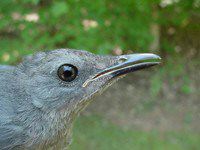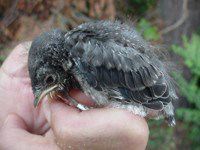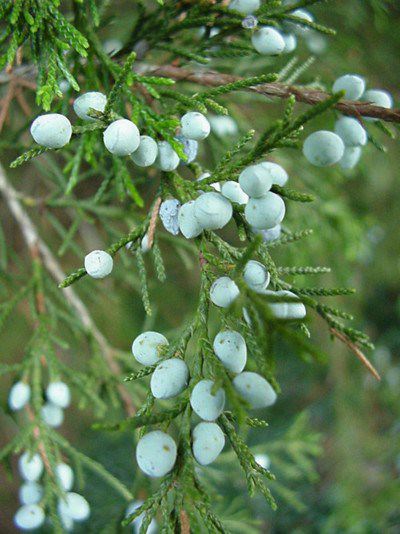
All photos © Hilton Pond Center
- Despite the on-going drought, here at Hilton Pond Center the Eastern Red Cedar trees are--unlike many hardwoods that are beginning to drop leaves--doing just fine. Red Cedars, which are really junipers (Juniperus virginiana), are evergreen trees with prickly needles that are wax-coated and well-adapted for retaining moisture in dry conditions. This year most of our cedar trees are thriving and already are producing a great crop of tiny blue berries (above) that likewise are protected from desiccation by a layer of wax.
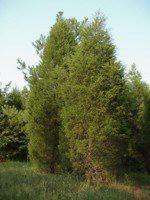 Red Cedars are one of the Piedmont's quintessential trees, mostly because they thrive in poor soil and sunny places--common characteristics of farmed-out and abandoned fields that dot the Piedmont landscape. They do poorly in shade, so as an old field goes through vegetational succession, broad-leafed hardwood trees eventually steal all the sunlight and the cedars die out. (A sizable old Red Cedar stump in the woods is a sure sign that the area was once an open field.) Each Red Cedar tree (right) is almost unique in appearance: the foliage of one tree may be a deep, dark green while the one beside it is greenish blue, and one might be tall, thin, and quite pointed while its neighbor is squat and almost spherical in shape. Red Cedars are one of the Piedmont's quintessential trees, mostly because they thrive in poor soil and sunny places--common characteristics of farmed-out and abandoned fields that dot the Piedmont landscape. They do poorly in shade, so as an old field goes through vegetational succession, broad-leafed hardwood trees eventually steal all the sunlight and the cedars die out. (A sizable old Red Cedar stump in the woods is a sure sign that the area was once an open field.) Each Red Cedar tree (right) is almost unique in appearance: the foliage of one tree may be a deep, dark green while the one beside it is greenish blue, and one might be tall, thin, and quite pointed while its neighbor is squat and almost spherical in shape.
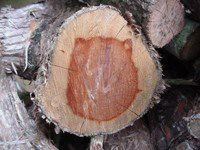 Although often taken for granted, Red Cedars are economically valuable because their aromatic wood does not rot quickly and splits easily--just the right combination for fence posts. The end of a Red Cedar log (right) shows the heartwood that gives the tree its name. This deep rich color makes Red Cedar a popular wood for rustic furniture and also for storage chests--especially those in which woolens might be stored. Cedar oil is a natural repellent for moths and other vermin that might destroy the chest's contents. Although often taken for granted, Red Cedars are economically valuable because their aromatic wood does not rot quickly and splits easily--just the right combination for fence posts. The end of a Red Cedar log (right) shows the heartwood that gives the tree its name. This deep rich color makes Red Cedar a popular wood for rustic furniture and also for storage chests--especially those in which woolens might be stored. Cedar oil is a natural repellent for moths and other vermin that might destroy the chest's contents.
- Red Cedars are common fencerow trees, primarily because birds eat their blue berries and pass the seeds undigested while they perch on barbed wire and utility lines. The cedar seeds fall to earth--along with a little natural fertilizer in the bird droppings--and many of them germinate. This method of seed dissemination is so effective that in the Piedmont, a fencerow may appear to be a nearly unbroken row of Red Cedar trees--as is the case at Hilton Pond Center along the DeVinney Road frontage (below).
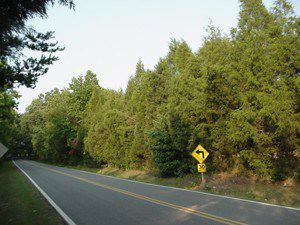
- Birds aren't the only organisms that consume Red Cedar berries. In fact, an extract from the cedar tree's fruit is what gives gin its distinctive favor. (The word "gin" is a derivative of "genievre"--a French word meaning "juniper berry.")
|


